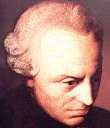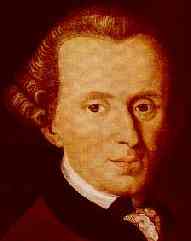
|
|
|
Contents |
Kant rejected the atomic conception of the mental world that set the agenda
for early Modern philosophy. He argued that you couldn't think of experience
as experience simply of particular inputs from the senses. For you to have experience
of any particular 'input' your mind had to categorise it in some way.
|
Overheads |
So you might say that he thought the process of experience to be analysable into two elements. On the one hand there was the particular input from sense and on the other there is the 'category' under which we subsume the sense element in becoming aware of it. 'Having an experience' or experiencing something is said in this way to involve two things: sensory input and categorisation.
'If any item is even to enter into our conscious experience we must be able to classify it in some way, to recognise it as possessing some general characteristics.' Strawson, The Bounds of Sense, London, 1966, Methuen, p.20.
The 'categorisation' is done, in Kant's terminology, through the application of 'concepts'. The items the concepts are applied to (so making experience possible) are 'intuitions'.
Kant thinks of the mind as consisting of a number a different 'departments' or 'faculties'. The faculty responsible for applying concepts is the 'understanding'. The faculty mediating 'intuitions' is the 'sensibility'. Thus, as he encapsulates it,
'An intuition that is mediated through the sensibility has to be brought under a concept by the understanding'.
To readThe Transcendental Analytic Especially The Second Analogy - Principle of succession in time. The Third Antinomy - Causality and freedom |
Our experience of the world therefore depended on two things: what our senses deliver, and what structure our conceptualisation imposes on the deliverances of sense.
Where did Kant think the structuring concepts came from?
The empiricist answer (to this empiricist question!) was not available to Kant. He couldn't say: from sense. His claim was that we can only have experience by applying concepts to the deliverances of sense. The concepts, that is to say, have to be in place 'before' we can have any experiences. Or more carefully: our having concepts is a condition of our having experience.
I will not say at this stage where he thought they came from. But it is clear that he cannot understand them as coming from experience. Having them is a precondition of experience.
|
Web stuff
|
How important is the 'categorising' function?
The categorisations through which experience becomes possible appear therefore to be very significant indeed.
To explore further how he thought of our categorising function, we need to get clear about the notion of the 'synthetic apriori'. Kant was the philosopher who introduced the 'synthetic apriori', and in fact he defined his project in the Critique of Pure Reason, his most important work, as answering the question: 'How are synthetic apriori judgements possible?'
We have encountered in earlier thinkers the distinction between empirical truths and analytical truths. Hume was very emphatic about this distinction, and emphatic too that to be a truth a proposition had to be one or the other. Remember the sense of Hume's Fork. Presented with any proposition, Hume insists we ask: 'Is it a proposition relating ideas? If not, is it a report of an experience, or a generalisation of experiences? If not, it cannot be intelligible. There is no third way.'
Kant thought there was a third way.
Let's be clear about the first two ways first.
The first kind of claim - or statement, or proposition, or judgement - I'm treating these as interchangeable for the sake of getting across the jizz of Kant's position - recognised by Hume are what are called 'analytic' claims. We have encountered two ways of formulating what makes a claim 'analytic'. One way is to say an analytic claim is a claim about the relations between ideas. Both Locke and Hume recognised a category of claim defined in this way.
An example which both would have recognised is: 'brothers are male'. They would understand this to be true in virtue of the relation between the idea of a brother and the idea of maleness. The idea of a brother includes the idea of maleness, it would be said.
These days we don't work with the notion of an idea in the same way that they did. But we would say something at least closely similar about this claim. We would say: it's a claim about the meanings of words. Part of the meaning of 'brother' is 'being male'.
So we've got at least half a grip on 'analytic'. A proposition that is analytic says something (a) if we are in an 18th Century context, something about the relationship between two or more ideas (eg that my idea of brother includes the idea of maleness) or (b) if we are in a contemporary context, something about the relationship between the meanings of words (eg a 'brother' is by definition male).
Let us think, in the absence of anything better, of a synthetic proposition as a proposition that isn't analytic.
 |
Let us reprise another distinction. Some propositions express knowledge that is arrived at on the basis of 'experience', in the sense of observations or experiments. 'Brothers often quarrel' is an example. These propositions sail under the name 'a posteriori'. Other propositions express knowledge that is gained by means that do not involve observation or experience. Our knowledge that 'brothers are male' is an example here. We don't need to conduct any surveys or carry out any messy experiments to ascertain this: we just need to reflect.
Put these two distinctions in a grid:
| A priori | A posteriori | |
| Analytic | Brothers are male
|
|
| Synthetic | Brothers often quarrel
|
Could there be any truths that are synthetic a priori?
Try and remember/think of candidates for this status before mousing over the
synthetic apriori box.
Kant argued that there were such truths.
He had in mind the conditions of experience. His thought was, as I have aid above, that we have to have a framework of 'categories' if we are to have experience of any kind. To set out these categories, and to show how they are essential to having experience, is to establish knowledge that is not derived from observation or experiment - it is done by thinking or reflection - so it is a priori knowledge. But it is knowledge which describes neither relationships between meanings of words (nor relationships between 18th Century ideas), and so is not analytic in character. To describe the system of categories that are necessary for experience is therefore to issue judgements that are both a priori and synthetic.
We may be tempted to think of Kant as describing the concepts as contributed by something we may be tempted to call our 'cognitive apparatus'.
Kant didn't speak of 'cognitive apparatus' - that is the phrase reached for by commentators. I suppose there is a cognitive apparatus, a sort of machinery which is involved whenever we perceive something.
Kant was writing before the idea of 'software', and before Babbage, come to that, but maybe that is the most suggestive idea.

'Raw data' comes in from the outside world through the senses. It is then processed, the end result being that we 'see' a skua, or a tea-shop.
So it is tempting to think that 'concepts' are somehow part of the 'structure' of the mind. Here is an analogy:
And another:
This would be the view that important features of our experience are contributed by us.
To remind you: Kant says is that there are two (relevant) 'faculties' of the
mind: a faculty he calls 'sensibility' and a faculty he calls 'understanding'.
 The receptive
faculty, the faculty through which we have intuitions, he calls the 'sensibility'.
The faculty which is the source of our concepts is the faculty of 'understanding'.
It is an active faculty.
The receptive
faculty, the faculty through which we have intuitions, he calls the 'sensibility'.
The faculty which is the source of our concepts is the faculty of 'understanding'.
It is an active faculty.
So it is a tempting idea that Kant's concepts are ordering principles in our
minds or brains which 'structure' raw data as it comes in to us through our
senses and generates experience as we know it.
In trying to get a further grip on Kant's project my guide will be Peter Strawson, whose book The Bounds of Sense I recommend as an exciting way into Kant, and also for an austere intellectual character all of its own.
 The project
The project'It is possible to imagine kinds of world very different from the world as we know it. It is possible to describe types of experience very different from the experience we actually have. But not any purported and grammatically permissible description of a possible kind of experience would be a truly intelligible description. There are limits to what we can conceive of, or make intelligible to ourselves, as a possible general structure of experience. The investigation of these limits, the investigation of the set of ideas which forms the limiting framework of all our thought about the world and experience of the world, is, evidently, an important and interesting philosophical undertaking. No philosopher has made a more strenuous attempt at it than Kant.' Strawson, The Bounds of Sense, p.15.
Kant develops his arguments for what experience must be like in order for it to count as experience at all - develops his account of the 'limits' of experience - in 'the Transcendental Analytic'.
The core of the argument is in the 'Transcendental Deduction of the Categories': 'that section of the Critique which cost Kant, and costs his readers, the greatest labour, being one of the most abstruse passages of argument, as also one of the most impressive and exciting, in the whole of philosophy.' Strawson, The Bounds of Sense, p.25.
We take Kant therefore to be engaged in the project of laying out the relations between our fundamental concepts, concepts and relations which he thinks are essential for any kind of experience to be possible.
In setting out and and arguing for the necessity of the framework of conceptions which he thinks experience requires, Kant seems to be involved in assuming or propounding, among others, the following propositions (I take these formulations from Strawson):-
This is not argued for by Kant. He assumes it is true.
Can anyone contest it? Can we imagine experience outside time?
This is the claim that for there to be experience a subject has to have it.
We considered the argument that the Cogito went too far when it concluded that
I exist. All it shows, it is said, is that 'there is a thought': 'there is doubt'.
Could there be an experience without it being the experience belonging to something?
Kant argues that there couldn't: that to be an experience it has to be owned by an experiencer.
I am owning the experience I get when I look at the wall when I say 'I' am seeing the wall.
'I' am feeling sick.
'I' am hearing the birds.
Scruton says: There is contained in every thought, as of every mental content, the notion of a subject.
Mrs Gradgrind in Hard Times is reported as believing on her deathbed that there was a pain somewhere in the room, but not that it was hers. Such a state of affairs was regarded by Kant as unintelligible. There can't be an experience that does not 'belong' to a subject - an 'experiencer'. (Scruton, p.142.)
I have not said what his argument for this conclusion is. I am just trying to explain what the claim is. The argument comes later.
We are talking here of the self. Kant says that there has to be a self in order for there to be experience.
Cutting corners, this is the thesis that for experience to be possible at all, you have to think of yourself as belonging to a world which is 'real' in the sense of existing independently of your experience of it.
The world you must think of yourself as belonging to must be spatial.
You must think of everything in the real world as belonging to one and the same space and one and the same time framework.
End
Credits
Skua pic thanks to Roy & Pat Beckemeyer
Brothers quarrelling pic: Brothers fighting, Vale Park, New Brighton (1985) by Tom Wood
Philosophy in the 17th and 18th Centuries Home
Prepared by VP